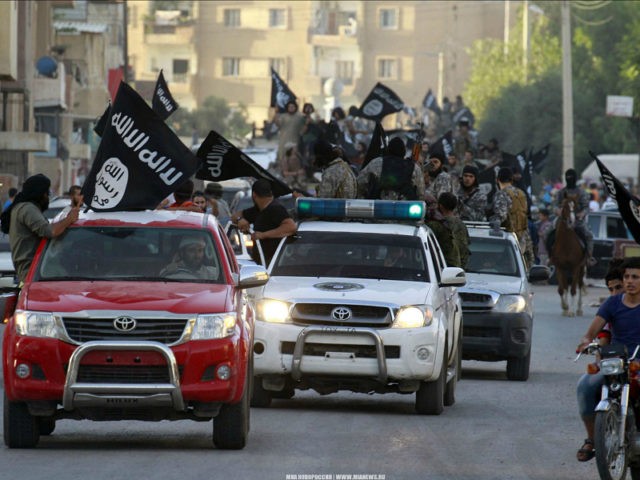According to The Washington Post, the Trump administration has decided to scrap the Obama White House plan for recapturing the Islamic State capital of Raqqa in Syria.
The plan took over seven months to prepare and involved “dozens of meetings of President Barack Obama’s top national security team, scores of draft battle plans and hundreds of hours of anguished, late-night debates,” according to the Post:
There were no good options, but Obama’s top foreign policy advisers were convinced that they had finally settled on an approach that could work — arming Kurdish fighters in northern Syria, current and former U.S. officials said. There was just one problem: The Obama team had deliberated for so long that there was little time left to pull the trigger. Trump’s advisers had also sent word that they wanted to make the decision.
So on Jan. 17, just three days before the transfer of power, Obama directed his national security adviser to hand over to the Trump team a paper detailing the plan to arm the Kurds, including talking points that President Trump could use to explain the move to Turkey’s president, who officials knew would be furious. The Turks viewed the Kurdish fighters as terrorists and their No. 1 enemy.
Obama hoped that his last-minute preparations would clear the way for Trump to authorize a swift assault on the Islamic State’s most important stronghold, where U.S. intelligence officials say militants are plotting attacks outside Syria.
The Turks are currently holding that “view” of the Kurds from rather close range, especially in the area around al-Bab, where Turkish President Recep Tayyip Erdogan speaks of “finishing the job.” That would be an improvement over previously stated Turkish plans to push on to Manbij, which would probably touch off a much wider conflict with the Kurds. The next stop after Manbij is the suburbs of Raqqa.
The Trump administration decided not to oblige Obama by swiftly authorizing this extremely risky operation. A senior Trump official told the Post, “They provided the information, but we found huge gaps in it. It was poor staff work.”
This seems to have touched off an exchange of barbs between the Trump and Obama teams, for while The Washington Post does not attribute a direct quote to any Obama officials, it reports: “Those who steered the Obama administration’s Syria policy insisted that the new White House did not understand the complexity of the issue, but soon would.”
The Washington Post article also nonchalantly discloses that, when the Obama White House was freaking out over the rise of ISIS and looking for someone to serve as America’s boots on the ground, the Kurds who took the job did have links to the Kurdistan Workers’ Party (PKK) separatists in Turkey. The Obama administration usually denied this when Turkey brought it up, insisting that Kurdish forces working with the U.S. in Syria were entirely separate from the PKK.
Conversely, the Kurds have been fighting courageously and skillfully on America’s behalf against ISIS, making do with minimal armament. Obama’s policy of seeking proxy fighters, so as not to be held responsible for deploying American troops, not only made a murky disaster of his Syrian policy but has occasionally resulted in U.S.-armed fighters shooting at each other. One can see why Team Trump might want to consider its options very carefully before using an Obama plan to launch a fierce battle for Raqqa, with high potential for civilian casualties.
The New York Times reports that Trump’s more aggressive strategy may include “American artillery on the ground in Syria and Army attack helicopters.” Secretary of Defense James Mattis is working with General Joseph F. Dunford Jr., Chairman of the Joint Chiefs of Staff, to re-examine American military options. These new plans are said to be Mattis’s top priority and are due on the president’s desk within 30 days.
The Times has Mattis and his planners thinking about working with the Turks, who are in turn seeking better relations with both the United States and Russia, rather than arming the Kurds to take Raqqa. Turkey also has some Syrian opposition groups under its wing that could join the battle.
Mattis may also be tasked with fulfilling President Trump’s proposal for safe zones in Syria, an endeavor where Turkish cooperation would be very helpful. The Turks say they’ve wanted safe zones in Syria since the beginning of the civil war and point to the town of Jarablus, which their proxies liberated from the Islamic State, as an example of how it could be done.
On the other hand, the Turks may be on a collision course with Syria’s military, which has begun warning Turkey to pull its forces back. It would be politically difficult for the U.S. to work with Syria (and, by extension, Russia and Iran) to take the Syrians’ own city back from ISIS, but if the Syrians are not heavily involved in the operation, it raises the question of who gets Raqqa — or what’s left of it — after the Islamic State is ejected.

COMMENTS
Please let us know if you're having issues with commenting.